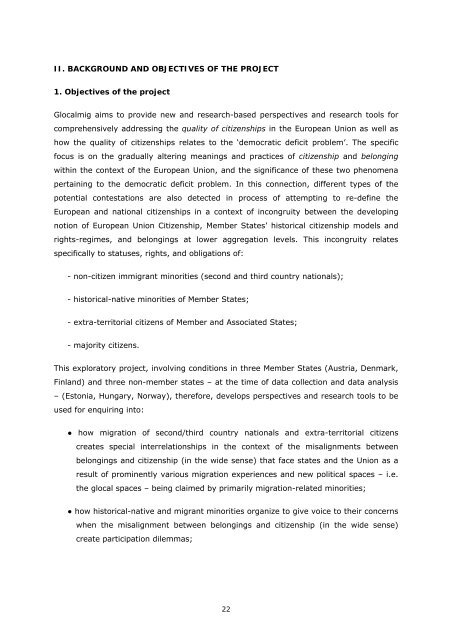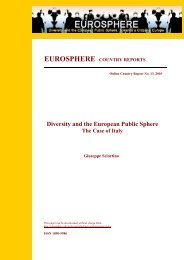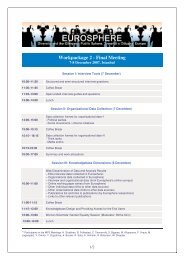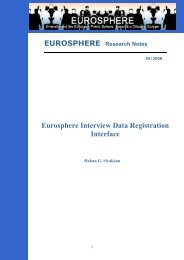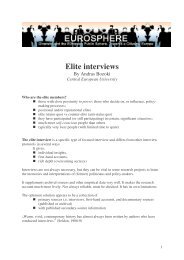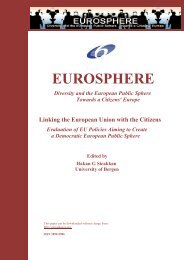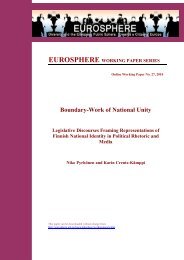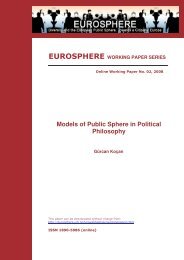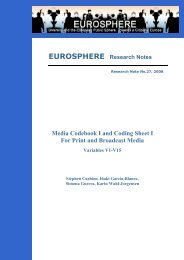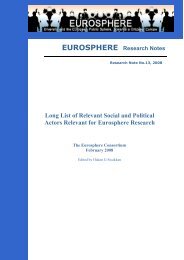Migrants, Minorities, Belongings and Citizenship. Glocalization and ...
Migrants, Minorities, Belongings and Citizenship. Glocalization and ...
Migrants, Minorities, Belongings and Citizenship. Glocalization and ...
Create successful ePaper yourself
Turn your PDF publications into a flip-book with our unique Google optimized e-Paper software.
II. BACKGROUND AND OBJECTIVES OF THE PROJECT<br />
1. Objectives of the project<br />
Glocalmig aims to provide new <strong>and</strong> research-based perspectives <strong>and</strong> research tools for<br />
comprehensively addressing the quality of citizenships in the European Union as well as<br />
how the quality of citizenships relates to the ‘democratic deficit problem’. The specific<br />
focus is on the gradually altering meanings <strong>and</strong> practices of citizenship <strong>and</strong> belonging<br />
within the context of the European Union, <strong>and</strong> the significance of these two phenomena<br />
pertaining to the democratic deficit problem. In this connection, different types of the<br />
potential contestations are also detected in process of attempting to re-define the<br />
European <strong>and</strong> national citizenships in a context of incongruity between the developing<br />
notion of European Union <strong>Citizenship</strong>, Member States’ historical citizenship models <strong>and</strong><br />
rights-regimes, <strong>and</strong> belongings at lower aggregation levels. This incongruity relates<br />
specifically to statuses, rights, <strong>and</strong> obligations of:<br />
- non-citizen immigrant minorities (second <strong>and</strong> third country nationals);<br />
- historical-native minorities of Member States;<br />
- extra-territorial citizens of Member <strong>and</strong> Associated States;<br />
- majority citizens.<br />
This exploratory project, involving conditions in three Member States (Austria, Denmark,<br />
Finl<strong>and</strong>) <strong>and</strong> three non-member states – at the time of data collection <strong>and</strong> data analysis<br />
– (Estonia, Hungary, Norway), therefore, develops perspectives <strong>and</strong> research tools to be<br />
used for enquiring into:<br />
● how migration of second/third country nationals <strong>and</strong> extra-territorial citizens<br />
creates special interrelationships in the context of the misalignments between<br />
belongings <strong>and</strong> citizenship (in the wide sense) that face states <strong>and</strong> the Union as a<br />
result of prominently various migration experiences <strong>and</strong> new political spaces – i.e.<br />
the glocal spaces – being claimed by primarily migration-related minorities;<br />
● how historical-native <strong>and</strong> migrant minorities organize to give voice to their concerns<br />
when the misalignment between belongings <strong>and</strong> citizenship (in the wide sense)<br />
create participation dilemmas;<br />
22


